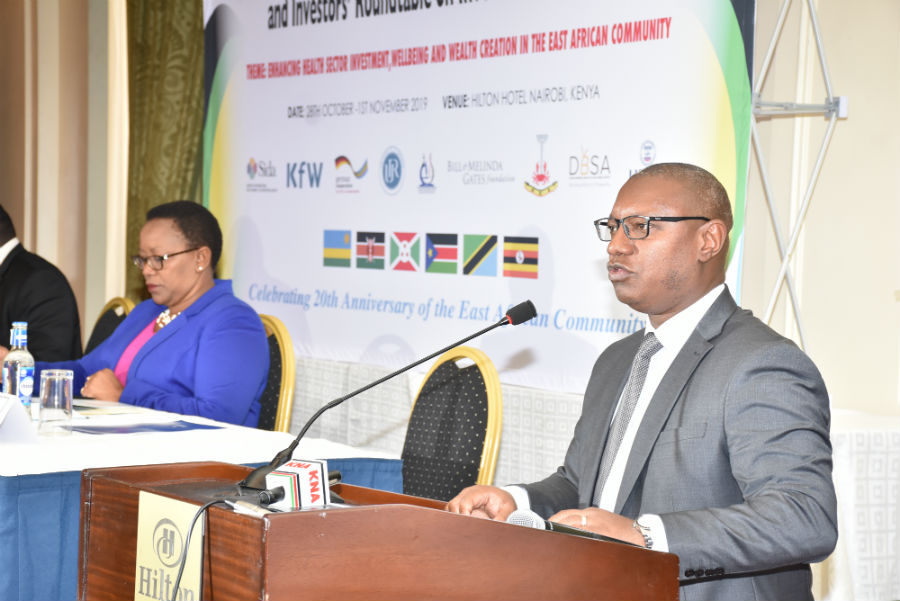
Investment in Health Sector critical to the development of EAC region
...as region looks to mobilize USD$3.5 billion for Nine (9) Health Sector Priorities
East African Community Headquarters, Arusha, Tanzania, 31st October 2019: The Chairperson of EAC the Sectoral Council on Health and Minister of State In charge of Public Health and Primary Health in Rwanda, Dr. Patrick Ndimubanzi has said investment in health is critical for ensuring human and socio-economic development in East Africa.
“As we invest in health, it’s my conviction that our investments are made in strategic areas, that offer maximum value for money and benefit to the people of East Africa,” said Dr. Ndimubanzi.
The Minister called for stronger partnerships that leverage the unique skills and resources of governments, civil society, and the private sector to improve the delivery of health services in the region.
The Minister was addressing delegates during the official opening session of the 2nd EAC Ministerial, Development Partners and Investors Roundtable in Health Sector today in Nairobi, Kenya.
Dr. Ndimubanzi underscored the private sector’s involvement in health systems as significant in scale and scope, adding that it includes the provision of health-related services, medicines and medical products, financial products, training for the health workforce, information technology, infrastructure as well as support services.
He informed the delegates that as donor funding declines and health care costs rise, domestic resource mobilization is a must.
“The private sector is encouraged to invest more in health service delivery and fill a significant part of the Universal Health Coverage (UHC) financing gap through sustainable business models,” said the Minister.
Dr. Ndimubanzi called for the delegates attending the Roundtable discussion to see how the region can mobilize adequate resources to support implementation of the EAC Health Sector Investment Priorities.
On his part, the EAC Deputy Secretary General in charge of Productive and Social Sectors, Hon. Christophe Bazivamo informed delegates that the roundtable discussion provides an opportunity for all Parties, Governments and Development Partners to re-affirm their commitments to the EAC Health Sector Integration Agenda, Universal Health Coverage (UHC) and UN Sustainable Development Goals (SDG) Number 3 on Good Health and Well Being with its 13 targets.
The 13 targets include: reducing maternal mortality; ending preventable deaths under five (5) years of age; fighting communicable diseases; reducing mortality from non-communicable diseases and promoting mental health; preventing and treating substance abuse; reducing road injuries and deaths; universal access to sexual and reproductive care; family planning and education, and;
Other targets are: achieving universal health coverage; reducing illness and death from hazardous chemicals and pollution; implementing the World Health Organization Framework Convention on Tobacco Control; supporting research, development and universal access to affordable vaccines and medicines; increasing health financing and support the health workforce in developing countries and improve early warning systems for global health risks.
Hon Bazivamo said that investing in healthcare systems not only saves lives but is also a crucial investment in the wider economy. This is because ill health impairs productivity, hinders job prospects and adversely affects human capital development. He said Good Health was not only an outcome of, but also a foundation for, development.
“I am pleased to inform you that since the Summit of Heads of State adopted the Health sector investments Priorities Framework, we so far have been able to mobilise investments and secure commitments of 83 million Euros. It is my sincere prayer and hope that these two days will provide more impetus in securing more commitments and investments into the EAC region,’’ said Hon. Bazivamo.
In her remarks, Dr. Anastasia Nyalita, the Chief Executive Officer of the Africa Healthcare Federation representing the private sector, disclosed that more than 40% of health services delivery in the EAC region are provided by Non State Actors (NSAs) as documented in periodic Country Health Sector reviews since 2012.
She said the disparity between EAC Partner States on policies and laws regulating manufacturing and importation of medicines and medical devices prevent the region from benefiting from the economies of scale.
She called for a harmonized framework for medicines and medical devices regulation that will accelerate the move towards realizing the Common Markets vision while assuring the citizens of access to affordable, safe and quality products.
The 2nd roundtable event brings together EAC Ministers of Health, Ministers responsible for EAC Affairs, Permanent/Principal/Under Secretaries, Heads of the HIV Commissions/Councils and other Senior Officials from relevant Ministries including Finance, Education, Science and Technology; bilateral and multilateral development partners including banks (KfW, African Development Bank and World Bank), diplomatic missions, private business and innovators, UN Agencies, civil society organizations, and faith based organizations, cultural institutions, research and academic institutions.
The two-day roundtable discussion is expected to come up with a roadmap on the Implementation arrangements of the nine (9) Health Sector Investment Priorities and resource mobilization for the same.
- ENDS -
For more information, please contact:
Simon Peter Owaka
Senior Public Relations Officer
Corporate Communications and Public Affairs Department
EAC Secretariat
Arusha, Tanzania
Tel: +255 768 552087
Email: sowaka [at] eachq.org
About the East African Community Secretariat:
The East African Community (EAC) is a regional intergovernmental organisation of six Partner States, comprising Burundi, Kenya, Rwanda, South Sudan, Tanzania and Uganda, with its headquarters in Arusha, Tanzania.
The EAC Secretariat is ISO 9001: 2008 Certified
